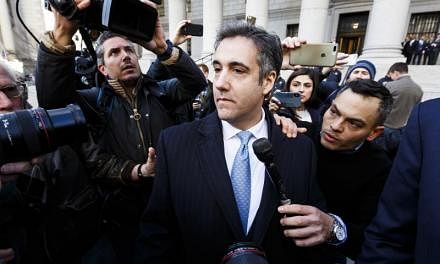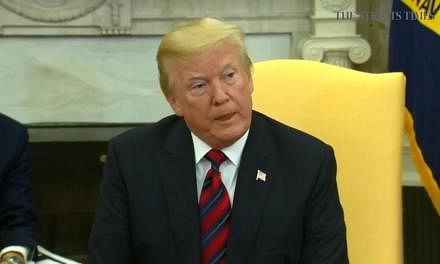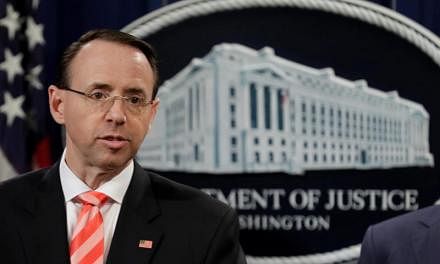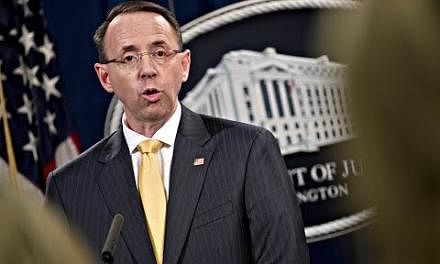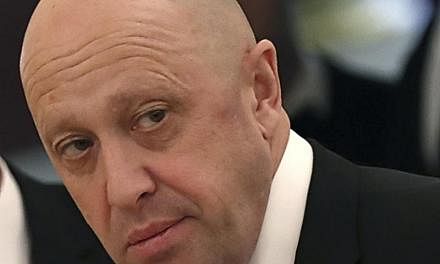WASHINGTON (AFP, NYTIMES) - The past week has seen extraordinary political turmoil in Washington, as President Donald Trump faces grave accusations that he has obstructed justice.
The Republican leader faces allegations he asked his FBI director James Comey to halt a probe of a senior former adviser, and dismissed Comey in a bid to curb an investigation into his campaign team's possible collusion with Russia.
With the White House running damage control, and critics smelling blood, some Democrats have mentioned the "I" word - impeachment - as a possibility for the 45th president, although initiating the procedure remains a hypothetical.
Still, the early chatter has heightened interest in how the impeachment process works. Here's what you need to know:
What is impeachment?
The Constitution permits Congress to remove presidents before their term is up if enough lawmakers vote to say that they committed "treason, bribery, or other high crimes and misdemeanors."
Only three presidents have been subjected to impeachment proceedings. Two were impeached but acquitted and stayed in office: Andrew Johnson in 1868 and Bill Clinton in 1998.
Johnson was impeached and nearly removed from office three years after the Civil War. His policies for reconstruction of the South angered radical Republicans in Congress who felt his approach was too lenient on the former Confederate states.
Clinton was impeached by the House of Representatives on the grounds of perjury and obstruction of justice in connection with an extramarital affair he had with White House intern Monica Lewinsky.
A third, Richard Nixon, resigned in 1974 to avoid Certain impeachment by Congress over the Watergate political espionage scandal.
What is the process?
First, the House of Representatives votes on one or more articles of impeachment. If at least one gets a majority vote, the president is impeached - which essentially means being indicted. (In both the Nixon and the Clinton cases, the House Judiciary Committee considered the matter first.)
Next, the proceedings move to the Senate, which holds a trial overseen by the chief justice of the Supreme Court. A team of lawmakers from the House, known as managers, play the role of prosecutors. The president has defense lawyers, and the Senate serves as the jury.
If at least two-thirds of the senators find the president guilty, he is removed, and the vice president takes over as president.
What's the role of the courts?
They don't have one.
"There isn't any judicial review of impeachment decisions, so Congress just needs to be satisfied that Trump committed high crimes or misdemeanors," Jens David Ohlin, a law professor and associate dean at Cornell Law School told AFP.
"They are the ultimate judge of what meets that standard."
Impeachment therefore is at the crossroads of politics and the law.
"There's no requirement that the president must have been indicted" for a crime, Ohlin added.
How far along are we?
The process hasn't started - and may never start.
Two Democrats in the House of Representatives, Maxine Waters and Al Green, have called for articles of impeachment to be drawn up, but most lawmakers are holding fire, fearing it could transform the process into a purely partisan exercise.
Senior Democrats say it is too early to call for impeachment, and that the facts of the case must first be established.
"It cannot be perceived as an effort to nullify the election by other means," said Adam Schiff, the top Democrat on the House Intelligence Committee.
Several lawmakers point out however that obstruction of justice is an impeachable offense. It was Nixon's downfall during Watergate, and led to Clinton's impeachment in the House.
The latest allegation suggesting obstruction of justice is the report that in February Trump asked Comey to back away from the probe into his former national security adviser, Michael Flynn. Comey is said to have written a memo about the meeting during which Trump allegedly made the request.
Justin Amash, a Republican who has been critical of Trump in the past, agreed that if the Comey memo proves to be true, it would constitute grounds for impeachment. He was the first Republican lawmaker to raise the possibility publicly. "But everybody gets a fair trial in this country," he added.
For that reason, members of Congress are impatiently waiting for Comey to accept their invitation to testify before them, and give his version of events for the first time.

